Lord Hayward, a Conservative peer and top polling guru, has written to the elections watchdog calling for a crackdown on anonymously-funded polls, alongside measures to ensure results are not subsequently misrepresented in news articles.
It comes after Lord Frost organised a £40,000 survey that forecast a 1997-style victory for the Labour Party. The former chief Brexit negotiator refused to reveal the names of those who funded the poll, which was conducted by YouGov and commissioned by a group called the Conservative Britain Alliance.
Read Lord Hayward’s letter in full below:
Dear John [Pullinger, chair of the Electoral Commission],


I am writing to you as chair of the Electoral commission and will be copying in Sir Robert Chote of UKSA.
The role of opinion polls and how they should be ‘regulated’ has a varied history. As you know, there have been attempts to ensure that polls are linked to another news story rather than treated as news in themselves, accusations of continuous inaccuracy and much more besides. They are now treated most often as news stories and the issue of accuracy has also fortunately disappeared from the headlines. As a result, despite the proliferation of polls, the industry has in recent years been left somewhat to its own devices and been merely regarded as part of the political scene with individual polls taken at face value.
However, in the meantime, much of the political/electoral world has been moved into an era of more required transparency and regulation. Whether that has been successful is a matter or personal judgement. International finance of political parties has been made the subject of ever more restriction/reporting, as has social media in general. Social media political messaging is now required to have identifiable imprints and beneficial ownership is a term well understood worldwide.
Concurrently, because of limited barriers to entry there has been a proliferation of new polling companies with ‘overnight polls’ often with ‘push’ questions becoming commonplace. I declare my dislike of both.
It would seem that recent events have highlighted the need for the ‘polling world’ to catch up with other aspects of politics and electioneering. I believe that it might be appropriate for the Electoral Commission and possibly the UKSA either to act or look at acting on a range of issues. I list below a few questions but I am sure there are others:-
- Is it really correct that a poll can be undertaken will no credible identifiable ‘beneficial owner’?
- Are British election polls adequately protected from external finance/influence?
- Would it be appropriate for all polls to be published with the equivalent of an imprint?
- If a poll is to be published should the polling company be required/able to correct, prior to publication, representation of the data provided?
- Should the manner of push questioning be reviewed?
- Where ‘push’ questions and the like are used should this be considered as ‘campaigning’ and therefore within your remit?
- Should the client be required to identify formally whether any poll data will be published as part of a news/election story?
While it may seem natural that the British Polling Council should ‘control’ its members, I know from personal experience, doing so is remarkably difficult if not impossible for a voluntary industry body. I am sure they will want to maintain the good name of the industry and will have views on the questions I have raised and probably others.
In light of the imminence of a General Election may I ask that the Electoral Commission look at the matters raised above and whether they are worth considering in more detail.
I would be happy to discuss the contents of this letter which I will, at some stage, release to the media. I will give you notice, in advance, of my intention to do so. I will also be copying in the officers of the BPC.
Thank you for your assistance in this matter. I would be happy to discuss this with you or your colleagues at any point.
Lord Hayward












